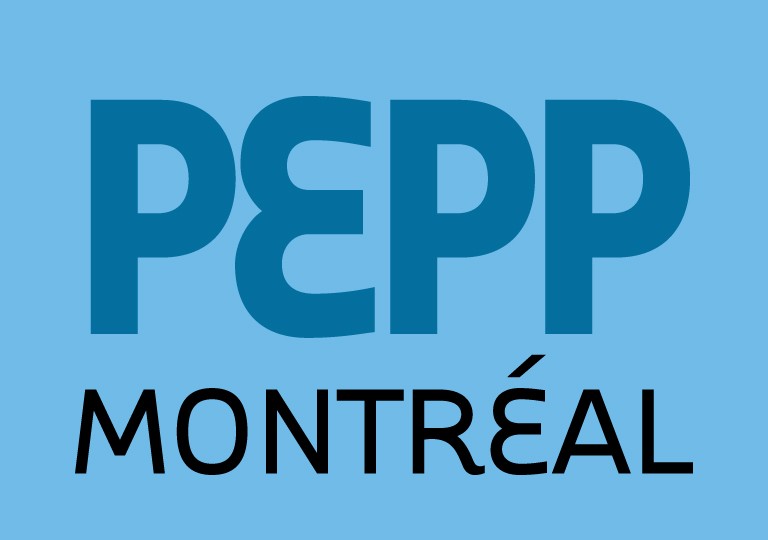 Research is an important and integral part of the Prevention and Early Intervention Program for Psychoses (PEPP). Clinical, education and research activities are integrated in such a way that research findings help us improve our services.
Research is an important and integral part of the Prevention and Early Intervention Program for Psychoses (PEPP). Clinical, education and research activities are integrated in such a way that research findings help us improve our services.
Through the integration of research activities in our program, patients and their families benefit from new knowledge resulting in state-of-the-art diagnostic and treatment methods for the early stages of psychosis.
Research aims at furthering our understanding of the nature of psychotic disorders, the impact of such disorders on patients and their families, and the development and evaluation of new approaches to treatment and prevention.
Research projects
PEPP-Montréal researchers come from various backgrounds and have strong collaborations with experts working in different disciplines at the Douglas Institute, across Canada and around the world. Specific research studies within PEPP focus on how biological and environmental factors combine to influence the risk for and outcomes of psychotic disorders.
The following research projects are currently being conducted at PEPP:
1.Neurocognitive and neuroimaging markers of remission in first episode psychosis
Martin Lepage, PhD, Ashok Malla, MD FRCPC, Ridha Joober, MD, PhD, Jens Pruessner, PhD
Started in 2004- ongoing recruitment
Using functional Magnetic Resonance Imaging (fMRI), the study compares brain activity for recognition memory (memory retrieval) in a group of subjects with First Episode of Psychosis (FEP) in whom memory retrieval dysfunction might be an important aspect of their symptomatology, and in healthy control subjects. It is hypothesized that problems of memory in subjects with FEP are associated with abnormal activity in specific portions of the brain. In this longitudinal study, participants are scanned when they enter the study, and again one year and two years following the initial scan.
Funding: Canadian Institutes for Health Research
2. Genetics of schizophrenia and its phenotypic variability
Ridha Joober, MD PhD, Guy Rouleau, MD
Started in 2006- ongoing recruitment
The study seeks to understand how genetics might influence mental health. There is strong evidence that one or several disturbed genes (such as COMT, Glutamate receptor 3, BDNF) can lead to changes in behaviour that are typical for patients suffering from psychosis. Genes contain DNA which are molecules containing all the transmissible genetic information which control the activities of the body cells. DNA provides the instructions for determining the hereditary characteristics of a person such as eye colour and blood type. Genetic properties will be determined from a blood sample drawn from the participant’s arm
3. A randomized controlled evaluation of “extended specialized early intervention service” vs. “regular care” for management of early psychosis over the five-year critical period
Ashok Malla, MD, Ridha Joober, MD, PhD, Thomas Brown, PhD, Eric Latimer, PhD, Norbert Schmitz, PhD, Srividya Iyer, PhD, Amal Abdel-Baki, MD, Ross Norman, PhD, Merete Nordentoft, PhD, Nicolas Cascalanda, MD
Started in 2006 – ongoing recruitment
“Early intervention” in psychosis is a relatively new concept in mental health. It is designed to improve outcome in schizophrenia through earlier detection of untreated psychosis and provision of effective, phase specific treatments. While the results of an early intervention approach to treatment of first episode psychosis are encouraging it remains to be seen how long such specialized interventions should be sustained to produce a longer lasting beneficial effect on the long-term course of illness. This is a multi-site randomized controlled study comparing long-term effectiveness of continued specialized treatment (using our PEPP-Montreal model of modified assertive case management treatment) with the alternative regular care (provided by regular mental health services) in a sample of first-episode patients who have completed two years of treatment in an Early Intervention Program for Psychoses.
Funding: Canadian Institutes for Health Research
4. Testing the feasibility, acceptability, and benefits of using web-based and mobile technologies to optimize the delivery of mental health services for youth diagnosed with a first episode of psychosis
Shalini Lal, PhD, post doctoral fellow, Ashok Malla, MD, FRCPC
This innovative 3-year proposed project involves adapting and testing a new on-line intervention that aims to reduce relapses (e.g., hospitalizations) and improve the quality of life and recovery of youth diagnosed with a first episode of psychosis. In addition, we will systematically synthesise the relevant literature and conduct a needs assessment with youth prior to adapting and testing the intervention.
This will be the first Canadian study on the use of web-based and mobile technologies to deliver specialized services to youth with psychosis. It will bring together an interdisciplinary and international group of researchers specializing in mental health IT, youth mental health, first episode psychosis, relapse prevention, recovery, and knowledge translation.
The results will improve our knowledge on the benefits and challenges of delivering mental health interventions to youth using web-based and mobile technologies, and provide important information on whether this type of approach warrants further implementation in the Canadian mental health care system. The project ultimately seeks to optimize access and quality of the delivery of youth-oriented mental health care in Canada and also contributes towards global efforts in improving access to mental health care for youth
5. Assessing the therapeutic efficacy and tolerability of Aripripazole in patients with first episode psychosis – a naturalistic outcome study
Ashok Malla, MD., FRCPC; Ridha Joober, MD, PhD, Martin Lepage, PhD
This research protocol is testing the practical utility of the “safety first” option in the present clinical research protocol, in order to obtain scientific information on multiple dimensions of outcome such as efficacy, side effects, cognition, changes in brain structures and quality of life; when initiating antipsychotic therapy. This study will be carried out in specialized early intervention services at the Douglas Institute PEPP-Montreal, and will enable us to examine the safest therapeutic options in the treatment of psychosis, which will ultimately help improve our services towards helping patients with symptom management.
Funding: Bristol Meyer Squibb
6. First Episode Psychosis in Montreal, Canada and Chennai, India: examining multiple outcome domains and the differential role of family factors.
Ashok Malla, MD, FRCPC, T. Rangaswamy, MD, Rhida Joober, MD, PhD, Norbert Schmitz, PhD, Srividya Iyer, PhD, V. Taylor, MD, R. Padmavati, S. Lloyd.
Started in 2012 (pilot completed 2008-2010)- ongoing recruitment
The project involves collaboration between two teams with complementary strengths in culturally relevant schizophrenia research in India and pioneering first-episode psychosis research in Canada. Previous investigations of cross-culturally varied psychosis outcomes have often been limited by confounding factors such as differences in the duration of untreated psychosis and treatments received. To avoid this pitfall, the proposed study will focus on patients with previously untreated first-episode psychosis in Chennai, India and Montreal, Canada who will receive clearly defined and similar treatment for two years.
Key objectives are to investigate inter-site differences in a range of outcome domains and family factors and whether the differences in family factors contribute to variation in outcomes. Our premise is that the better outcomes of psychosis in India can be largely explained by the comparatively higher levels of family support available to persons with psychosis in India as compared to in developed countries such as Canada.
The project’s findings will advance our understanding of the course of early psychosis in India; of cross-cultural variation in schizophrenia outcomes; and of how families contribute to better outcomes in India. This understanding will shape the development of culturally appropriate family and early intervention services in India and suggest strategies for improving schizophrenia outcomes in the West, thus alleviating (even if partially) the severe burden that schizophrenia imposes irrespective of cultural setting.
Funding: Canadian Institute of Health Research
7. Insight and schizophrenia: psychological and neuronal determinants
Martin Lepage, PhD, Ashok Malla, MD, FRCPC, Ridha Joober, MD, PhD, Norbert Schmitz, PhD
Started in 2010 – ongoing recruitment
This is a cross-sectional study of multiple dimensions of insight. The study allows an exploration of various dimensions of insight and provide new information as to how these different dimensions are related to specific psychological and biological factors. Data is collected on insight, psychopathology, neurocognition, metacognition and neuroimaging (neural anatomy and activity) in a large cohort of patients with schizophrenia. Efforts will be made in concentrating on patients who have been ill for at least five years .The main aim is to examine the independent dimensions of insight across multiple clinician rated and self-report measures of insight.
Funding: Canadian Institute of Health Research
8. Persistent symptoms associated trajectories and treatment evaluation in routine care of non- acute schizophrenia/PATTERN
Ashok Malla, MD, FRCPC, Martin Lepage, PhD, Ridha Joober, MD, PhD
International, multi-center, non-interventional, observational prospective, cohort study of patients with persistent symptoms of schizophrenia attending psychiatry outpatient clinics, with two phases: A cross-sectional phase (baseline observation) and a longitudinal phase of 24 months of follow up. The objectives of this study are to evaluate clinical and patient-reported outcomes and pharmaco-economic outcomes in patients with persistent symptoms of schizophrenia, not linked to any particular intervention or the presence of particular symptoms, and optionally their caregivers, followed for 2 years under conditions of routine clinical practice.
Funding: Roche Ltd.
9. Testing an innovative low cost model for improving mental health services in a rural district in Kashmir
Ashok Malla, MD, MBBS, FRCPC; Mushtaq Margoob, MD; Thara Rangaswamy, MD; Srividya Iyer, PhD; Shalini Lal, PhD; Ridha Joober, MD, PhD; Marc Laporta, MD
Project to begin in 2013 (2013-2015)
This project seeks to provide basic mental healthcare services using an innovative, low-cost model in parts of the Ganderbal district (including the town of Ganderbal and the region up to Kangan with a total population of 100,000) within the conflict-ridden Kashmir valley of northern India. We will work with pre-existing resources in the region and train lay-health workers to provide mental health services to youth between the ages 14 and 35. Data on outcomes related to functioning, quality of life and symptoms will also be collected and monitored. The entire project will be facilitated through the use of education and training provided through netbooks, cellular phones, and a cloud based database. Bus-mounted clinics will also be used to treat patients.
Funding: Canadian Institutes of Health Research: Grand Challenges Canada

